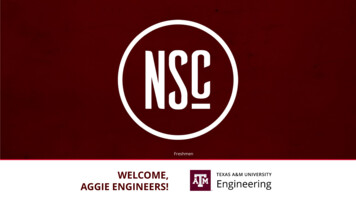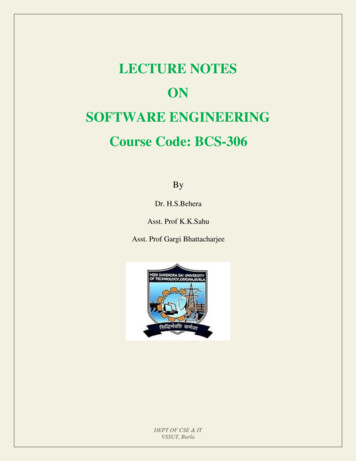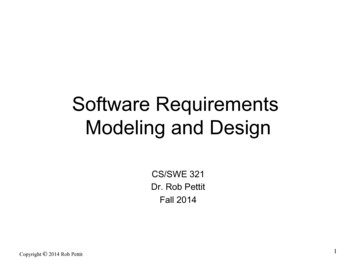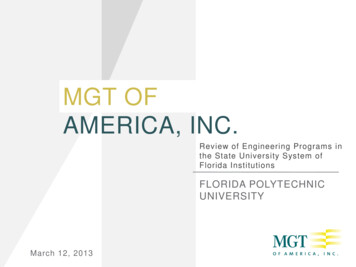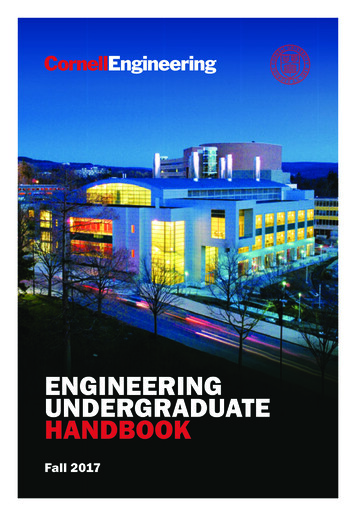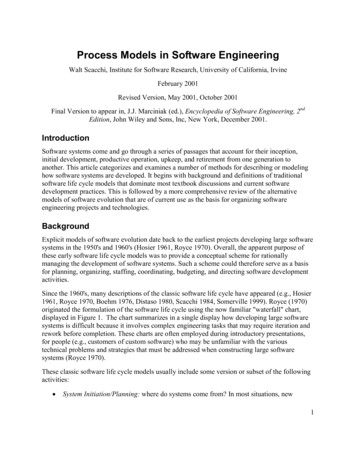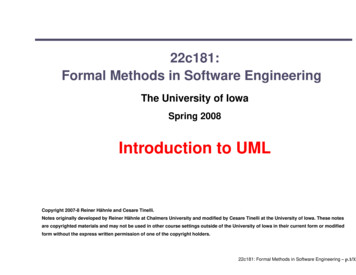
Transcription
FREE FOR COURSE USE WITH WRITTEN PERMISSION; EMAIL THE MARKKULA CENTER FORAPPLIED ETHICS AT ETHICS@SCU.EDU. NOT FOR PUBLICATION OR OTHER UNAUTHORIZEDDISTRIBUTION.An Introduction to Software Engineering EthicsMODULE AUTHORS:Shannon Vallor, Ph.D. Associate Professor of Philosophy, Santa Clara UniversitySPECIAL CONTRIBUTOR TO INTRODUCTION:Arvind Narayanan, Ph.D. Assistant Professor of Computer Science, Princeton UniversityThese documents contain fields that can be filled in by users who have downloaded the free AdobeReader. Simply download the appropriate document to your computer, type your comments in theboxes, and save the completed version. To send the version with your responses, include it as anattachment to an email.What do we mean when we talk about ‘ethics’?Ethics in the broadest sense refers to the concern that humans have always had forfiguring out how best to live. The philosopher Socrates is quoted as saying in 399 B.C.,“the most important thing is not life, but the good life.”1 We would all like to avoid a lifethat is shameful and sad, wholly lacking in achievement, love, kindness, beauty, pleasureor grace. Yet what is the best way to achieve the opposite of this – a life that is not onlyacceptable, but even excellent and worthy of admiration? This is the question that thestudy of ethics attempts to answer.Today, the study of ethics can be found in many different places. As an academic field of study, it belongs primarily to the discipline of philosophy, where scholars teach andpublish research about the nature and structure of ethical norms. In community life, ethicsis pursued through diverse cultural, political and religious ideals and practices. On apersonal level, it can be expressed in an individual’s self-reflection and continual strivingsto become a better person. In work life, it is often formulated in formal codes or standardsto which all members of a profession are held, such as those of medical ethics. Professionalethics is also taught in dedicated courses, such as business ethics. It can also be infusedinto courses such as this one.What is ethics doing in a course for software engineers?Like medical, legal and business ethics, engineering ethics is a well-developed area ofprofessional ethics in the modern West. The first codes of engineering ethics wereformally adopted by American engineering societies in 1912-1914. In 1946 the NationalSociety of Professional Engineers (NSPE) adopted their first formal Canons of Ethics. In2000 ABET, the organization that accredits university programs and degrees inengineering, began to formally require the study of engineering ethics in all accreditedprograms: "Engineering programs must demonstrate that their graduates have anunderstanding of professional and ethical responsibility.”2 Professional engineers today,then, are expected to both learn about and live up to ethical standards as a condition of theirmembership in the profession.12Plato, Crito 48b. In Cahn (2010).ABET 2000 criterion 3(f) (ABET, 1998).
But the average computer/software engineering student might still be confused abouthow and why this requirement should apply to them. Software engineering is a relativelyyoung practice and compared with other engineering disciplines, its culture ofprofessionalism is still developing. This is reinforced by the fact that most engineeringethics textbooks focus primarily on ethical issues faced by civil, mechanical or elecricalengineers. The classic case studies of engineering ethics depict catastrophic losses of lifeor injury as a result of ethical lapses in these fields: the Challenger explosion, the FordPinto fires, the Union Carbide/Bhopal disaster, the collapse of the Hyatt walkway inKansas City. When we think about the engineer’s most basic ethical duty to “holdparamount the safety, health, and welfare of the public,”3 it is clear why these cases arechosen - they powerfully illustrate the importance of an engineer’s ethical obligations,and the potentially devastating consequences of failing to live up to them.But software engineers build lines of code, not cars, rockets or bridges full of vulnerablehuman beings. Where is the comparison here? Well, one answer might already haveoccurred to you. How many cars or rockets are made today that do not depend uponcritical software for their safe operation? How many bridges are built today without theuse of sophisticated computer programs to calculate expected load, geophysical strain,material strength and design resilience? A failure of these critical software systems canresult in death or grievous injury just as easily as a missing bolt or a poorly designed gastank. This by itself is more than enough reason for software engineers to take seriouslythe ethics of their professional lives. Is it the only reason? What might be some others?Consider the following:The software development and deployment process in the Internet era has somepeculiarities that make the ethical issues for software engineers even more acute in someways than for other types of engineers. First, the shortened lifecycle has weakened and insome cases obliterated software review by management and legal teams. In the extreme,for Web applications like Facebook, it is normal for individual engineers or small groupsof engineers to code and deploy features directly, and indeed the culture takes pride inthis. Even where more traditional development practices prevail, at least somedeployments like bug fixes are shipped with only technical (and not ethical) oversight. Atany rate, engineers at least retain the ability to deploy code directly to end users, an abilitythat can easily be abused.All of this is in stark contrast to say, a civil engineering project with a years-long (ordecades-long) lifecycle and multiple layers of oversight. Nor does such a project offer amalicious engineer any real means to obfuscate her output to sneak past standards andsafety checks.Second is the issue of scale, perhaps the defining feature of the software revolution.Typically the entire world is part of the addressable market. Of course, it is scale that hasled to the potential for individual engineers to create great good, but with it naturallycomes the ability to cause great harm, especially when combined with the first factorabove.3NSPE Code of Ethics for Engineers, First Fundamental Canon.2
Here’s a rather benign but illustrative example. On June 9, 2011, Google released a“doodle” honoring Les Paul which users found addictive to play with. This is a type ofproject that’s typically done by an individual engineer on their “20% time” in a day ortwo. A third party, RescueTime, estimated that 5.3 million hours were spent playing thisgame.4 Let us pause to consider that 5.3 million hours equates to about eight lifetimes.Did the doodle make a positive contribution to the world? Do engineers at Google havean obligation to consider this question before releasing the feature? What principle(s)should they use to determine the answer? These are all valid questions, but what isperhaps even more interesting here is the disproportionality between the amount of timeengineers spent creating the feature (at most a few person-days, in all likelihood), and theamount of time users spent on it (several lifetimes). Often, in today’s world, engineersmust grapple with these questions instead of relying on management or anyone else.Finally, the lack of geographic constraints means that engineers are generally culturallyunfamiliar with some or most of their users. The cost-cutting imperative often leaves littleroom for user studies or consultations with experts that would allow softwaredevelopment firms to acquire this familiarity. This leads to the potential for privacyviolations, cultural offenses, and other such types of harm.For example, people in many countries are notoriously sensitive to the representation ofdisputed border territories on maps. In one recent example, an error in Google maps ledto Nicaragua dispatching forces to its border with Costa Rica. Google then worked withUS State Department officials to correct the error.5On top of these considerations, software engineers share with everyone a basic humandesire to flourish and do well in life and work. What does that have to do with ethics?Imagine a future where you are faced with a moral quandary arising from a project youare working on that presents serious risks to users. In that scenario, will you act in a waythat you would be comfortable with if it later became public knowledge? Would it matterto you whether your family was proud or shamed by your publicly exposed actions?Would it matter to you whether, looking back, you saw this as one of your better momentsas a human being, or one of your worst? Could you trust anyone to whom these outcomesdidn’t matter?Thus ethical obligations have both a professional and a personal dimension. Each areessential to consider; without a sense of personal ethics, one would be indifferent to theireffect on the lives of others in circumstances where one’s professional code is silent. Tounderstand what’s dangerous about this, consider any case in human history when aperpetrator of some grossly negligent, immoral or inhumane conduct tries to evade theirresponsibility by saying, ‘I was just following orders!’ So personal ethics helps us to besure that we take full responsibility for our moral choices and their consequences.“Google Doodle Strikes Again! 5.3 Million Hours Strummed,” Rescue Time, Jun 92011.5 “Google Maps Embroiled in Central America Border Dispute,” AFP, Nov 6 2010.43
But for professionals who serve the public or whose work impacts public welfare, apersonal code of ethics is just not enough. Without a sense of professional ethics, onemight be tempted to justify conduct in one’s own mind that could never be justified infront of others. Additionally, professional ethics is where one learns to see how broaderethical standards/values (like honesty, integrity, compassion and fairness) apply to one’sparticular type of work. For example, wanting to have integrity is great – but what doesintegrity look like in a software engineer? What sort of specific coding practicesdemonstrate integrity, or a lack of it? This is something that professional codes of ethicscan help us learn to see. Finally, being a professional means being a part of a moralcommunity of others who share the same profound responsibilities we do. We can drawstrength, courage, and wisdom from those members of our professional community whohave navigated the same types of moral dilemmas, struggled with the same sorts of toughdecisions, faced up to the same types of consequences, and ultimately earned the respectand admiration of their peers and the public.Broadening our view of software engineering ethicsCertainly, software engineers must concern themselves primarily with the health, safetyand welfare of those who are affected by their work, as the so-called ‘paramountcy clause’of NSPE’s Code of Ethics states. But we need to broaden our understanding of a numberof aspects of this claim, including: The types of harms the public can suffer as result of this work;How software engineers contribute to the good life for others;Who exactly are the ‘public’ to whom the engineer is obligated;Why the software engineer is obligated to protect the public;What other ethical obligations software engineers are under;How software engineers can actually live up to ethical standards;What is the end goal of an ethical life in software engineering;What are the professional codes of software engineering ethics;Let’s begin with the first point.4
PART ONEWhat kinds of harm to the public can software engineers cause?What kinds of harm can they prevent?We noted above that failures of critical software systems can result in catastrophic lossof life or injury to the public. If such failures result, directly or indirectly, from softwareengineers’ choices to ignore their professional obligations, then these harms are clearlythe consequences of unethical professional behavior. Those responsible each bear themoral weight of this avoidable human suffering, whether or not this also results in legal,criminal or professional punishment.But what other kinds of harms do software engineers have an ethical duty to consider, andto try to prevent? Consider the following scenario:Case Study 1Mike is a father of 3, and in order to save for their college educations, he hasbeen working two jobs since his kids were born. His daughter Sarah hasworked as hard as she can in high school to get high grades and SAT scores;as a result of her hard work she has been accepted to a prestigious IvyLeague college, and the deposit for her first year is due today. If the depositgoes unpaid, Sarah loses her spot in the freshman class. Mike paid the billlast week, but today he gets an email from the college admissions officesaying that his payment was rejected for insufficient funds by his bank, andif he does not make the payment by the end of the day, Sarah will lose herplace and be unable to attend in the Fall. Panicked, Mike calls the bank – hehad more than enough money in his savings to cover the bill, so he cannotunderstand what has happened. The bank confirms that his account hadplenty of funds the day before, but cannot tell him why the funds are gonenow or why the payment was rejected. They tell him there must be some‘software glitch’ involved and that they will open an investigation, but thatit will take weeks to resolve. They will only restore the funds in his accountonce the investigation is completed and the cause found. Mike has no otherway to get the money for the deposit on such short notice, and has to tellSarah that he couldn’t cover the bill despite his earlier promise, and that shewon’t be attending college in the Fall.5
Question 1.1:What kinds of harm has Mike probably suffered as a result of this incident? Whatkinds of harm has Sarah probably suffered? (Make your answers as full as possible;identify as many kinds of harm done as you can think of).Type your answer hereQuestion 1.2:Could the problem with Mike’s account have been the result of an action (or afailure to perform an action) by a software engineer? How many possiblescenarios/explanations for this event can you think of that involve the conduct ofone or more software engineers? Briefly explain the scenarios:Type your answer here (continue answer on next page if needed)6
(Continue your answer to 1.2 from previous page)Question 1.3:Taking into account what we said about ethics in the introduction, could any of thescenarios you imagined involve an ethical failure of the engineer(s) responsible?How? Explain:*Note: An ethical failure would be preventable, and one that a good human beingwith appropriate professional care and concern would and should have prevented(or at least have made a serious effort to prevent).Type your answer here7
Let’s try a different scenario:Case Study 2Karen is a young lawyer at a prestigious firm with an incredibly hectic andstressful schedule, who needs to organize what little free time she has moreefficiently. She has just downloaded a new app called Errand Whiz onto heriPhone; this app merges information from Karen’s to-do list, information onher purchasing habits from retail stores she shops at, and GPS software toproduce the most efficient map and directions for running errands on her daysoff. Based on what it knows about what she needs to purchase and her generalshopping habits, it tells Karen what locations of her favorite stores to visit ona given day, in what order and by what routes – this way she can get hererrands done in the least amount of time, traveling the least number of miles.To accomplish this, the app aggregates information not only about where shelives and shops, but also tracks what she typically buys in each store, howmuch she buys, what she typically pays for each item. This collected data isnot stored on Karen’s phone, but on a separate server that the app links towhen it needs to create a shopping map. The app encourages users to log invia Facebook, as the developers have made a deal with Facebook to sell thisdata to third-party advertisers, for the purpose of targeting Facebook ads toKaren and her friends.Question 1.4: In what ways could Karen potentially be harmed by this app,depending on how it is designed and how her shopping data is handled and used?Identify a few harmful scenarios you can think of, and the types of harm she couldsuffer in each:Type your answer here (continue on next page if needed)8
(Continue your answer to 1.4 from previous page)Question 1.5: Which if any of these harms could result from ethical failings onthe part of the people who developed Errand Whiz? How, specifically?Type your answer here (continue on next page if needed)9
(Continue your answer to 1.5 from previous page)Question 1.6: What actions could the people behind Errand Whiz take to preventthese harms? Are they ethically obligated to prevent them? Why or why not?Explain your answer.Type your answer hereIdeally, these scenarios have helped to broaden your understanding of the ethical scopeof software engineering. In considering and protecting the ‘health, safety and welfare’ ofthe public, we must not limit our thinking to those contexts in which our design choicesor coding practices have the potential to cause someone’s death, or cause them directphysical injury. The harms that people can suffer as a result of failures by software engineers toconsider their ethical obligation to the public are far more numerous and more complex than wemight think.10
PART TWOHow do software engineers contribute to the good life for others?There is a second way in which we need to broaden our understanding of engineeringethics. Ethics is not just about avoiding harms, as a narrow focus on preventingcatastrophic events might make us believe. Ethics is just as much about doing good.‘Doing good’ is not something that matters only to missionaries, social workers andphilanthropists. To live a ‘good life’ is to make a positive contribution to the worldthrough your existence, to be able to say at the end of your life that in your short timehere, you made the world at least somewhat better than it would have been without you init. This is also how we think about the lives of those who have left us: when we mournour friends and loved ones, we comfort ourselves by remembering the unique comfortsand joys they brought to our lives, and the lives of others; we remember the creative workthey left behind, the problems they helped us solve, and the beautiful acts they performed,great and small. Could a life about which these things could not be said still be a good life?If the good life requires making a positive contribution to the world in which others live,then it would be perverse if we accomplished none of that in our professional lives, wherewe spend many or most of our waking hours, and to which we devote a large proportionof our intellectual and creative energies. Excellent doctors contribute health and vitalityto their patients and medical knowledge to their interns and colleagues; excellentprofessors cultivate knowledge, insight, skill and confidence in their students and contributethe benefits of their research to the wider community; excellent lawyers contribute balance,fairness and intellectual vigor to a larger system of justice.Question 2.1: What sorts of things can excellent software engineers contribute tothe good life?(Answer as fully/in as many ways as you are able):11
Question 2.2: What kinds of character traits, qualities, behaviors and/or habits doyou think mark the kinds of people who tend to contribute most in these ways?(Answer as fully/in as many ways as you are able):PART THREETo whom are software engineers obligated by their professional ethics? Who is‘the public’ that deserves an engineer’s professional concern?The NSPE’s paramountcy clause asks engineers to recognize that their primaryprofessional duty is to ‘hold paramount the safety, health and welfare of the public.’ Butwho exactly is this ‘public?’ Of course, one can respond simply with, ‘the public iseveryone.’ But the public is not an undifferentiated mass; the public is composed of ourfamilies, our friends and co-workers, our employers, our neighbors, our church or otherlocal community members, our countrymen and women, and people living in every otherpart of the world. To say that we have ethical obligations to ‘everyone’ is to tell us verylittle about how to actually work responsibly as an engineer in the public interest, sinceeach of these groups and individuals that make up the public are in a unique relationshipto us and our work, and are potentially impacted by it in very different ways. We alsohave special obligations to some members of the public (our children, our employer, ourfriends, our fellow citizens) that exist alongside the broader, more general obligations wehave to all of them.12
One concept that ethicists often use to clarify our obligations to the public is that of astakeholder. A stakeholder is anyone who is potentially impacted by my actions.Clearly, certain persons have more at stake than other stakeholders in any given action Imight take; when I consider, for example, how much effort to put into cleaning up a buggyline of code in a program that will be used to control a pacemaker, it is obvious that thepatients in whom the pacemakers with this programming will be implanted are theprimary stakeholders in my action; their very lives are potentially at risk in my choice.And this stake is so ethically significant that it is hard to see how any other stakeholder’sinterest could weigh as heavily.Still, in most ethical contexts, including those that arise in software engineering, thereare a variety of stakeholders potentially impacted by my action, and their interests maynot always align with each other. For example, my employer’s interests in cost-cuttingand an on-time product delivery schedule may frequently be in tension with the interestof other stakeholders in having the highest quality and most reliable product. Yet eventhese stakeholder conflicts are rarely so simple as they might first appear; the consumeralso has an interest in an affordable product, and my employer also has an interest inearning a reputation for product excellence, and in maintaining the profile of a responsiblecorporate citizen.Of course, while my own trivial, short-sighted and self-defeating interests (say, in gainingextra leisure time by taking reckless coding shortcuts) will never trump a critical moralinterest of another stakeholder (say, their interest in not being unjustly killed by myproduct), it remains true that I myself am a stakeholder, since my actions also impact myown life and well-being. A decision to ignore my well-defined contractual obligations tomy employer, or my obligations to my fellow product team members, will have weightyconsequences for me. But ignoring the health, safety and welfare of those who rely uponthe code I produce has consequences that are potentially even graver – for me as well asfor those persons whose well-being I have chosen to discount or ignore.Ethical decision-making thus requires cultivating the habit of reflecting carefully upon the rangeof stakeholders who together make up the ‘public’ to whom I am obligated, and weighing what isat stake for each of us in my choice.Here is a scenario to help you think about what this reflection process can entail:Case Study 3You are a new hire in a product design team for a start-up company that isdeveloping new and more powerful versions of the kind of packet-sniffingand email scanning software systems used by law enforcement agencies andlarge corporations to monitor data traffic for illegal activities. This kind ofsoftware might, for example, be programmed to detect illegal downloads ofcopyrighted materials, or to flag for review email keywords like ‘bomb,’‘steal,’ or ‘bribe.’ You are a young parent of two small children, with parentsand friends who are deeply proud of your achievements. You are looking13
forward to using this first job to cultivate a reputation in your industry forbeing an excellent software engineer.One day, you happen to overhear your supervisor chatting with anothersupervisor about a new contract the company has recently received from aforeign government. You happen to recognize the name of this country asone that is currently run by an oppressive military regime that routinelyimprisons its citizens without trial or other due process. In this country,people perceived as political dissidents and their families are often sent tolabor camps with deplorable living conditions, without hope of appeal, for anindefinite period. Your own nation has strongly criticized this country’shuman rights record, and many international organizations as well as theUnited Nations have condemned its practices.You realize now that the product your team is working on is part of yourcompany’s contract with this government; and in fact, you have beenassigned specifically to develop the part of the product that searches forspecific keyword strings in private emails, texts, social networkingmessages, Skype and phone conversations. Reviewing the specs for yourtask, you realize that your contribution to the product will almost certainlybe used to identify for extraction and review conversations between privatecitizens of this country in which there is any specific discussion of theirgovernment or its policies, and especially those in which words like ‘reform,’‘injustice,’ ‘corruption,’ ‘due process’ or ‘human rights’ occur.Question 3.1: Who are the various stakeholders in this scenario, and what do theyeach have at stake in your action? Reflect carefully and deeply, and answer as fullyas possible.Type your answer here14
Question 3.2: What do you think is your ethical obligation in this situation?What do you think an excellent software engineer would do in this situation? Arethey the same thing, or different? Please explain your answer.Type your answer here15
PART FOURWhy do software engineers have ethical obligations to the public at all? Where dothese obligations come from?As you might expect by now, there is a simple answer to this question that willnevertheless lead us into a far more complex and profound set of considerations. Thesimple answer is, ‘because software engineers are human beings, and all human beingshave ethical obligations to each other.’ Unless you believe, for example, that you have noethical obligation to stop a small toddler who you happen to see crawling toward theopening to a deep mineshaft6, then you accept that you have some basic ethical obligationstoward other human beings.What those obligations are, precisely, is a matter of ethical theory, and many suchtheories have been developed over the course of human history. Some of these theoriesdeveloped in folk or religious traditions, others are articulated in scholarly philosophicaldiscourse from the ancient world to today. Among the most well-known and influentialtypes of theory are those of virtue ethics found in diverse cultures from Confucian ethicsto ancient Greek, Roman and Christian philosophy, along with the consequentialistgroup of theories that include utilitarianism, and finally deontological theories of ethicsthat emphasize rules and principles. We will briefly revisit these types of ethical theoryin the next section.Our question here, however, was not ‘what are my ethical duties?’ but rather ‘why do I havethem?’ That is not a question for ethical theory, it is a question of metaethics, or the studyof where our ethical duties come from and why they obligate us to act as they say weshould. Many answers have been given to this question, but before we get lost in aprofound philosophical problem, let us remember that in our case we are exploring thespecial ethical obligations of software engineers, which while not wholly independent of ourbroader ethical obligations as human beings, may have a more clearly identifiable sourceand justification.The first explanation of this source involves the concept of a profession. What is aprofessional? You may not have considered that this word is etymologically connectedwith the English verb ‘to profess.’ What is it to profess something? It is to stand publiclyfor something, to express a belief, conviction, value or promise to a general audience thatyou expect that audience to hold you accountable for, and to identify you with. When Iprofess something, I assert that this is something about which I am serious and sincere;and which I want others to know about me. So when we identify someone as a professionalX (whether ‘X’ is a lawyer, physician, soldier or engineer), we are saying that being an ‘X’is not just a job, but a vocation, a form of work to which the individual is committed andwith which they would like their lives to be identified.This example is adapted from one given by the Confucian philosopher Mencius (inIvanhoe and Van Norden 2001), who argued that anyone who would be unmoved bythe child’s peril was not truly human. In the contemporary medical vernacular wewould more likely diagnose such a person as a psychopath or sociopath.616
This is part of why professionals are generally expected to undertake advanced educationand training in their field; not only because they need the expertise (though that too), butalso because this is a important sign of their investment and commitment to the field.When students who have completed an arduous degree program enter the work world,this is taken as evidence that they are sincere in their interest in this kind of work, thatthey understand and uniquely value the contribution that this work makes to the world,and that they want their own personal good and sense of self to be enduringly intertwinedand identified wit
Like medical, legal and business ethics, engineering ethics is a well-developed area of professional ethics in the modern West. The first codes of engineering ethics were formally adopted by American engineering societies in 1912-1914. In 1946 the National Society of Professional Engineers (NSPE) adopted

